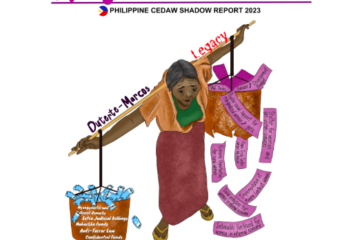
The Senate Committee on Women, Children, Family Relations and Gender Equality, chaired by Senator Risa Hontiveros, held its first Senate Public Hearing on the so-called Tres Maria bills – Anti-Rape Act, the Anti-Sexual Harassment Bill, and the Gender-Based Electronic Violence, on December 12, 2016.
“The measure of these three bills is to strengthen the existing laws and criminalize gender-based electronic violence and peer-to-peer sexual harassment. Also, there is an urgent need to institute measures to combat the prevalence of the rape culture in our society which leads to physical sexual assault and other forms of violence against women and children”, Hontiveros said during her opening remarks.
The three bills are on top of her priority legislative agenda, giving emphasis on the increasing incidence of sexual harassment, misogynist attacks and unwanted remarks against women, both online and offline.
Senate Bill No. 1251 or the Anti-Gender-Based Electronic Violence Bill seeks to penalize those responsible for misogynistic and homophobic attacks on social media. The offenses listed in this bill include harassing or threatening the victim through text messaging, posts in social media sites, or other cyber, electronic, or multimedia means.
Lisa Garcia, program manager of Gender and ICT Program of the Foundation for Media Alternatives participated in the public hearing to give initial statement and comments on SB 1251.
“Almost 73% of women and girls, aged 18-30 and younger are more likely to experience online violence. Facebook and mobile phones are the platforms where most commonly platforms in perpetuating online gender-based violence. Also, majority of the cases, emotional harm impeding women’s full participation in online and offline spaces.” Garcia said.
FMA has been mapping online gender-based violence cases since 2012. To date, FMA mapped one hundred sixty (160) cases of online gender-based violence in the country. These include cases of online harassment; cyber bullying; digital stalking; monitoring and tracking; identity theft (including deleting, changing and faking personal information); sexual (verbal) assault, threats and abusive comments; and uploading of photos and videos (often of an intimate nature) without consent.
Some government agencies who are present at the public hearing include the Philippine Commission on Women, National Bureau of Investigation-Cybercrime Division, Department of Information and Communications Technology, Philippine National Police-AntiCybercrime Group, Department of Justice and National Privacy Commission. Senators Win Gatchalian and Ping Lacson were also present during the said public hearing.
Along with Foundation for Media Alternatives, the Center for Women’s Studies, Galang-Pilipinas and Legal Alternatives for Women Center also attended the public hearing to give their organizational statements and comments. ###
![]()



0 Comments